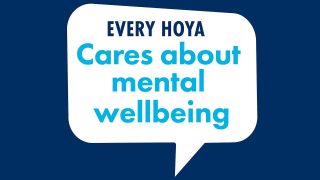1. Prepare for the holidays so you can be responsive rather than reactionary.
“Ask any GU athlete, ROTC member and many more in the community, and they will tell us preparedness is vital before any event,” says Wilhelm, an FSAP counselor. “If the holidays happen to us, we will face unanticipated outcomes leading us to be reactionary rather than responsive, and we would default to the ‘fight or flight’ experience. To be responsive, we would prepare ourselves ahead of events and activities.”
From the CAPS Skills Toolbox
2. Manage your expectations because nothing is perfect.
“The notion or expectation for perfection can set us up for failure. Tweaking our subjective views can offer ease in navigating the holidays,” says Wilhelm. “Let us remind ourselves repeatedly that holidays can offer a source for connection and bonds and not drive people apart. Let us note that the holiday is not long and that if things don’t go our way, it’s alright; we can problem-solve later. Let us make it a time to better ourselves and not focus on perfecting the picture.”
“Perfection is not an option for any of us! It can’t happen,” says Brletic, an FSAP counselor. “Good enough, is good enough!”
From the CAPS Skills Toolbox
- How can I be kinder to myself? (video)
- Self-compassion meditations (audio)
- Write a self-compassion letter (website)
- How can I interrupt my negative thinking? (pdf)
3. Reframe your stress so you don’t get weighed down by what you’ll handle in the future.
“In general, stress management is a little easier when we focus on what is before us and don’t overwhelm ourselves with everything that could be or is on our plate farther down the road,” says Brletic. “Don’t ‘pile on’ to yourself or build up debilitating steam by looking too far ahead. Get a general idea of what is ahead of you so that you can prioritize and identify time frames to accomplish things. Then, focus on what is on your plate for today and tomorrow.”
“We are often told that stress is bad for us,” says Kushlev, the assistant professor in the Department of Psychology. “Research, however, suggests that if we change our mindset about stress and think of it as a force that can motivate us, we will actually experience fewer negative consequences when we feel stressed.”
From the CAPS Skills Toolbox
- Stress management links and handouts (website)
- Stress management handout (pdf)
- How can I better manage my stress? (pdf)
4. Consider your priorities before engaging in conflict with loved ones.
“When you are around your family for the holidays, remember your priorities – family togetherness, love, memories,” says Brletic. “Taking on the task of ‘teaching’ your family how they should feel about politics, a point of view on social issues or trying to convince them of their misguided thoughts, most often, while valid, is practically not productive unless everyone commits to a balanced and thoughtful discussion. If the family is not on board with that process, it is not uncommon for the experience to devolve into arguments and hurt feelings – just the opposite of your stated priorities.”
“Let us find and focus on commonness with people and leave our differences for after the holidays,” says Wilhelm. “Let us find shared experiences through family albums, watching movies and playing games to bring back memories of togetherness.”
From the CAPS Skills Toolbox
5. Remember anger hurts you ‘first and more.’
“Whether we meet a disagreeable uncle or highly opinionated colleague, we will always come across someone who will say or do unpleasant things. We can examine our discomfort and seek to reframe our approach,” says Wilhelm. “Let us check our motivations for being upset and try to ease our anger because it hurts us first and more. Let us remind ourselves that we are all enduring heightened stress levels and allow for some grace if we can.”
From the CAPS Skills Toolbox
- Guided relaxation exercises (audio)
- How can I better manage my anger? (video)
- I need help coping with my distress right now (online skills list)
6. Take a break.
“Get off your phone, breathe, and take a mindful walk!” says Kushlev.



